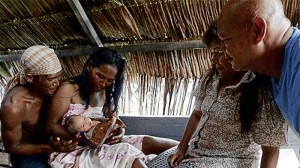It might have been the heightened public awareness on reproductive concerns and gender roles that brought about this coincidence of themes in two out of three of the most-awarded films of the 2012 Metro Manila Film Festival (MMFF).
Or, it might have been simply in the filmmakers’ acceptance of the traditional appraisal of women that “Thy Womb” and “One More Try” found common ground. (The historical epic “El Presidente” won the most awards in the festival.)
The lines “Gagawin ko ang lahat para sa asawa ko (I’ll do everything for my spouse)” or “Gagawin ko ang lahat para sa buhay ng anak ko (I’ll do everything for the life of my child)” are not spoken by a husband-father but by a wife-mother in each of the two movies.
What a poor childless midwife in Tawi-Tawi would do to give her husband a son—and meet the socio-cultural requisites to validate her husband’s male-worthiness—might not be much different from what a modern single mother would be willing to do to extend the life of an ill son.
Main conflict
Note that in both cases, the husbands bear sons, emphasizing that the sacrifice that the wife or mother undertakes is completely worthwhile.
Interestingly, both films generate more drama by showing that bearing/saving a son also cost the husband or father the mutual respect and relative happiness despite a childless marriage. Husbands-lovers must face the prospect of losing their present relationship because their mate must find a way to bear or save her child.
But it is the subtly internalized pressure for a woman to become a “good mother,” that provides the main conflict of both stories.
Both films involve a childless woman who has more success, and resilience, than her husband. These women both know that her social status does not measure up to her husband’s need to establish his male-worthiness.
This is seen as crucial in the community of “Thy Womb.” Shaleha (played by MMFF best actress Nora Aunor), more than her and her husband Bangas-An (Bembol Roco), makes determined attempts to find a second wife— a fertile womb—to bear his seed. But their painstaking joint effort to put together a dowry in cash and gold is almost as heartbreaking as the ultimate decision that they both must make to bring to life the child they wish for.
“One More Try” has the childless Jack (Angelica Panganiban) struggling to justify to herself and to her husband why her professional success is imperative to raising a life without poverty. This may have been an artificial struggle.
The scriptwriters might have strained to please religious conservatives and should have considered the reality that most women today, given the chance, or the choice, would prefer to be financially viable before raising a family.
But given that this anxiety increases the tension of the story line, the pro-life rationalization of sex outside marriage brings the film’s contention into the 21st century. Jack must temporarily surrender “ownership” of her husband Edward (MMFF best actor Dingdong Dantes)—and his sperm—so that she will not be guilty of depriving a child of a chance to live.
At the same time, Edward’s ex-flame Grace (Angel Locsin) will need to humiliate herself before Jack and Edward, and her current partner Tristan (Zanjoe Marudo), to save the life of her son. The tears flow mostly from Grace and Jack because there are no alternatives to women’s self-sacrifice, which they must endure. It has a happy ending with everyone in two interconnected families.
Unbearable
But for Shaleha, the conclusion might be unbearable, since the final condition for her husband marrying a second wife is the twist and the tragedy. And it may only be overcome if her old married life dies and gets reborn in the collective spirit of her community. Otherwise, it becomes the inhumane sacrifice of one woman.
